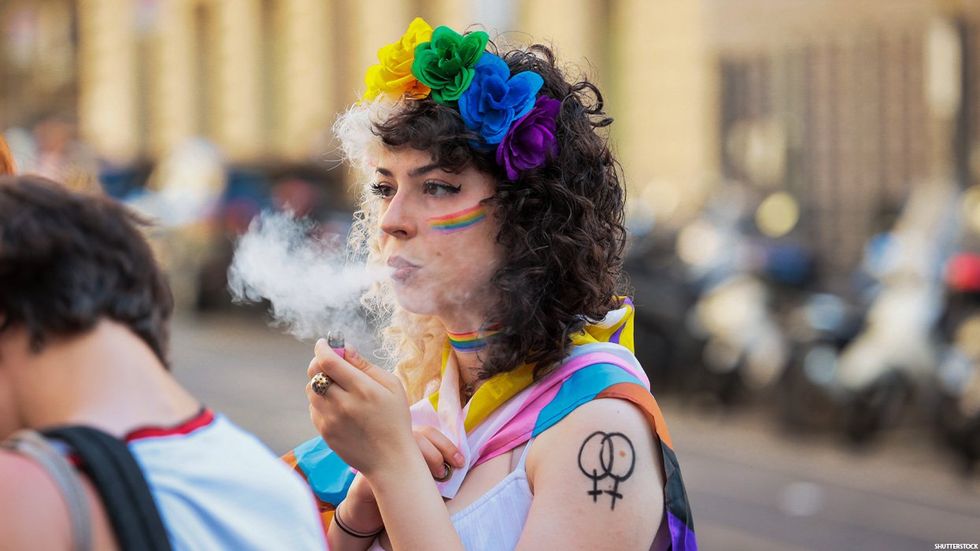All Rights reserved
By continuing to use our site, you agree to our Private Policy and Terms of Use.
For decades, LGBTQIA+ organizations have looked to build meaningful inroads and partnerships for Pride events to gain acceptance, build community, and make clear that queer people are here to stay and live open, authentic lives. While so many incredible people and organizations swiftly ushered in great progress, there is still an insidious actor harming our communities while acting as a partner — the tobacco industry.
As the Executive Director of the National LGBT Cancer Network, I’ve seen firsthand the harm done to LGBTQIA+ communities by Big Tobacco’s menthol cigarettes, flavored cigars, and flavored e-cigarettes. Fortunately, help is on the way. Last year, the FDA proposed a rule prohibiting the sale of menthol cigarettes and flavored cigars — a long-overdue regulation to protect millions. The FDA had said they aimed to issue the rule by August. This rule — which could save tens or hundreds of thousands of lives and start to lessen racial health disparities the moment it goes into effect — might be only days or weeks away. It’s my hope they finalize it soon, before more lives are lost.
We must recognize the harm that menthol cigarettes cause — their minty flavor deceptively soothes the throat and masks the irritation of smoking, meaning they’re easier for youth to start and harder for existing smokers to put down. This quality has let them successfully invade our communities; people who identify as LGBTQIA+ use tobacco products, including menthol cigarettes, at significantly higher rates than the general population. In fact, 51 percent of lesbian/gay and 46 percent of bisexual smokers use menthol cigarettes, compared to 39 percent of straight smokers (despite our efforts, this survey didn’t measure any of the other groups).
Trending stories
Higher rates of tobacco use among LGBTQIA+ communities isn’t just a coincidence, but rather the result of more than 20 years of predatory targeting by Big Tobacco. Take for example Project SCUM (a purported acronym for Sub-Culture Urban Marketing), a secret campaign from tobacco conglomerate R.J. Reynolds starting in the ‘90s that targeted gay men and homeless people with ads and product placement to increase sales while destroying our health. Soon after came more targeted advertising co-opting the language our communities use to fight for progress — the “freedom to inhale” and ads imploring viewers to “take pride in your flavor.”
Tobacco companies have worked to sponsor and profit from Pride events around the country since they started taking sponsors, with some going to great and unethical lengths to have their name “pink-washed” by financially supporting Pride events, despite their poisonous products clearly not bettering the community. Some Pride organizations are rejecting tobacco sponsorships, but tobacco companies are so determined to market to our communities that some industry executives pursuing Pride relationships go to great lengths to obfuscate their unethical interference. Just this year, I was approached by a vaping industry-hired lobbyist who was arranging meetings with all the national LGBTQIA+ organizations, offering to "partner" on projects and direct tobacco funding toward joint efforts.
But their efforts don’t stop at Pride events. Big Tobacco companies will donate to elected officials queer and straight, and in turn may curry favor with regards to any anti-tobacco initiative or legislation — ultimately blocking efforts to help the very communities who need it most.
It’s larger than elected officials, too. For years, tobacco lobbyists have claimed the companies want to get involved in “harm reduction” for the community. But harm reduction is just another co-opted term the tobacco industry uses to justify kid-friendly flavors in e-cigarettes. They hope we’ll be swayed by the middle-aged person they bring in to say how candy flavoring really helped them stop using combustible cigarettes — and forget to notice the sharp uptick in our youth addiction rates to those same products. Tobacco companies aren’t really interested in weaning people off their products; they’re just trying to appear as though they care. They only want to increase their bottom line.
In fact, these companies want to hook more kids as customers. Did you know the average age of coming out is almost identical to the average age of tobacco use initiation? Many in our communities start young, becoming addicted to tobacco products as they struggle with the social isolation of realizing they’re not like their peers. And with flavors like vanilla cake, banana smash, and twisted berry, it’s no surprise that millions of kids reported current use of any tobacco product in 2022. A large portion of our population doesn’t understand that tobacco is responsible for taking so many years off queer lives. Tobacco companies’ targeting comes at a cost to our communities. Imagine, for instance, if LGBTQIA+ communities had public health funding warning of the dangers of tobacco use that were equal to those of HIV/AIDS awareness?
Our communities need partners, not predators. Big Tobacco’s work to put a rainbow veneer on smoking and tobacco use does nothing to help our community and only worsens an already recognized health crisis. The FDA must finalize and quickly implement the proposed ban on menthol cigarettes and flavored cigars, and I urge every LGBTQIA+ aligned organization to reject funding from tobacco companies and see it for what it is: giving Big Tobacco permission to harm the very people you work to protect.
Scout is the Executive Director of the National LGBT Cancer Network.
Views expressed in The Advocate’s opinion articles are those of the writers and do not necessarily represent the views of The Advocate or our parent company, equalpride.

















































































